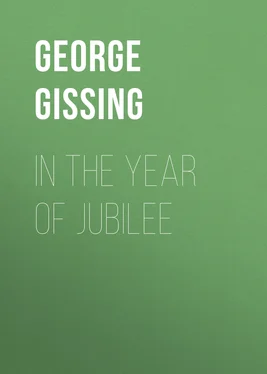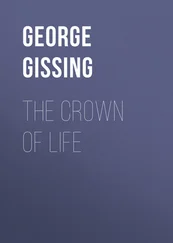George Gissing - In the Year of Jubilee
Здесь есть возможность читать онлайн «George Gissing - In the Year of Jubilee» — ознакомительный отрывок электронной книги совершенно бесплатно, а после прочтения отрывка купить полную версию. В некоторых случаях можно слушать аудио, скачать через торрент в формате fb2 и присутствует краткое содержание. Жанр: foreign_prose, literature_19, foreign_antique, на английском языке. Описание произведения, (предисловие) а так же отзывы посетителей доступны на портале библиотеки ЛибКат.
- Название:In the Year of Jubilee
- Автор:
- Жанр:
- Год:неизвестен
- ISBN:нет данных
- Рейтинг книги:4 / 5. Голосов: 1
-
Избранное:Добавить в избранное
- Отзывы:
-
Ваша оценка:
- 80
- 1
- 2
- 3
- 4
- 5
In the Year of Jubilee: краткое содержание, описание и аннотация
Предлагаем к чтению аннотацию, описание, краткое содержание или предисловие (зависит от того, что написал сам автор книги «In the Year of Jubilee»). Если вы не нашли необходимую информацию о книге — напишите в комментариях, мы постараемся отыскать её.
In the Year of Jubilee — читать онлайн ознакомительный отрывок
Ниже представлен текст книги, разбитый по страницам. Система сохранения места последней прочитанной страницы, позволяет с удобством читать онлайн бесплатно книгу «In the Year of Jubilee», без необходимости каждый раз заново искать на чём Вы остановились. Поставьте закладку, и сможете в любой момент перейти на страницу, на которой закончили чтение.
Интервал:
Закладка:
Mary’s eyes had fallen, and she kept silence.
‘Suppose anything happened to me, and they were left to themselves. I have money to leave between them, and of course they know it. How could it do them anything but harm? Do you know that Horace wants to marry that girl Fanny French—a grinning, chattering fool—if not worse. He has told me he shall do as he likes. Whether or no it was right to educate Nancy, I am very sure that I ought to have done with him as I meant at first. He hasn’t the brains to take a good position. When his schooling went on year after year, I thought at last to make of him something better than his father—a doctor, or a lawyer. But he hadn’t the brains: he disappointed me bitterly. And what use can he make of my money, when I’m in my grave? If I die soon he’ll marry, and ruin his life. And won’t it be the same with Nancy? Some plotting, greedy fellow—the kind of man you see everywhere now-a-days, will fool her for the money’s sake.’
‘We must hope they’ll be much older and wiser before they have to act for themselves,’ said Mary, looking into her master’s troubled face.
‘Yes!’ He came nearer to her, with a sudden hopefulness. ‘And whether I live much longer or not, I can do something to guard them against their folly. They needn’t have the money as soon as I am gone.’
He seated himself in front of his companion.
‘I want to ask you something, Mary. If they were left alone, would you be willing to live here still, as you do now, for a few more years?’
‘I shall do whatever you wish—whatever you bid me, Mr. Lord,’ answered the woman, in a voice of heartfelt loyalty.
‘You would stay on, and keep house for them?’
‘But would they go on living here?’
‘I could make them do so. I could put it down as a condition, in my will. At all events, I would make Nancy stay. Horace might live where he liked—though not with money to throw about. They have no relatives that could be of any use to them. I should wish Nancy to go on living here, and you with her; and she would only have just a sufficient income, paid by my old friend Barmby, or by his son. And that till she was—what? I have thought of six-and-twenty. By that time she would either have learnt wisdom, or she never would. She must be free sooner or later.’
‘But she couldn’t live by herself, Mr. Lord.’
‘You tell me you would stay,’ he exclaimed impulsively.
‘Oh, but I am only her servant. That wouldn’t be enough.’
‘It would be. Your position shall be changed. There’s no one living to whom I could trust her as I could to you. There’s no woman I respect so much. For twenty years you have proved yourself worthy of respect—and it shall be paid to you.’
His vehemence would brook no opposition.
‘You said you would do as I wished. I wish you to have a new position in this house. You shall no longer be called a servant; you shall be our housekeeper, and our friend. I will have it, I tell you!’ he cried angrily. ‘You shall sit at table with us, and live with us. Nancy still has sense enough to acknowledge that this is only your just reward; from her, I know, there won’t be a word of objection. What can you have to say against it?’
The woman was pale with emotion. Her reserve and sensibility shrank from what seemed to her an invidious honour, yet she durst not irritate the sick man by opposition.
‘It will make Nancy think,’ he pursued, with emphasis. ‘It will help her, perhaps, to see the difference between worthless women who put themselves forward, and the women of real value who make no pretences. Perhaps it isn’t too late to set good examples before her. I’ve never found her ill-natured, though she’s wilful; it isn’t her heart that’s wrong—I hope and think not—only her mind, that’s got stuffed with foolish ideas. Since her grandmother’s death she’s had no guidance. You shall talk to her as a woman can; not all at once, but when she’s used to thinking of you in this new way.’
‘You are forgetting her friends,’ Mary said at length, with eyes of earnest appeal.
‘Her friends? She’s better without such friends. There’s one thing I used to hope, but I’ve given it up. I thought once that she might have come to a liking for Samuel Barmby, but now I don’t think she ever will, and I believe it’s her friends that are to blame for it. One thing I know, that she’ll never meet with any one who will make her so good a husband as he would. We don’t think alike in every way; he’s a young man, and has the new ideas; but I’ve known him since he was a boy, and I respect his character. He has a conscience, which is no common thing now-a-days. He lives a clean, homely life—and you won’t find many of his age who do. Nancy thinks herself a thousand times too good for him; I only hope he mayn’t prove a great deal too good for her . But I’ve given up that thought. I’ve never spoken to her about it, and I never shall; no good comes of forcing a girl’s inclination. I only tell you of it, Mary, because I want you to understand what has been going on.’
They heard a bell ring; that of the front door.
‘It’ll be Miss. Nancy,’ said Mary, rising.
‘Go to the door then. If it’s Nancy, tell her I want to speak to her, and come back yourself.’
‘Mr. Lord—’
‘Do as I tell you—at once!’
All the latent force of Stephen’s character now declared itself. He stood upright, his face stern and dignified. In a few moments, Nancy entered the room, and Mary followed her at a distance.
‘Nancy,’ said the father, ‘I want to tell you of a change in the house. You know that Mary has been with us for twenty years. You know that for a long time we haven’t thought of her as a servant, but as a friend, and one of the best possible. It’s time now to show our gratitude. Mary will continue to help us as before, but henceforth she is one of our family. She will eat with us and sit with us; and I look to you, my girl, to make the change an easy and pleasant one for her.’
As soon as she understood the drift of her father’s speech, Nancy experienced a shock, and could not conceal it. But when silence came, she had commanded herself. An instant’s pause; then, with her brightest smile, she turned to Mary and spoke in a voice of kindness.
‘Father is quite right. Your place is with us. I am glad, very glad.’
Mary looked from Mr. Lord to his daughter, tried vainly to speak, and left the room.
CHAPTER 2
His father’s contemptuous wrath had an ill effect upon Horace. Of an amiable disposition, and without independence of character, he might have been guided by a judicious parent through all the perils of his calf-love for Fanny French; thrown upon his own feeble resources, he regarded himself as a victim of the traditional struggle between prosaic age and nobly passionate youth, and resolved at all hazards to follow the heroic course—which meant, first of all, a cold taciturnity towards his father, and, as to his future conduct, a total disregard of the domestic restraints which he had hitherto accepted. In a day or two he sat down and wrote his father a long letter, of small merit as a composition, and otherwise illustrating the profitless nature of the education for which Stephen Lord had hopefully paid. It began with a declaration of rights. He was a man; he could no longer submit to childish trammels. A man must not be put to inconvenience by the necessity of coming home at early hours. A man could not brook cross-examination on the subject of his intimacies, his expenditure, and so forth. Above all, a man was answerable to no one but himself for his relations with the other sex, for the sacred hopes he cherished, for his emotions and aspirations which transcended even a man’s vocabulary.—With much more of like tenor.
Читать дальшеИнтервал:
Закладка:
Похожие книги на «In the Year of Jubilee»
Представляем Вашему вниманию похожие книги на «In the Year of Jubilee» списком для выбора. Мы отобрали схожую по названию и смыслу литературу в надежде предоставить читателям больше вариантов отыскать новые, интересные, ещё непрочитанные произведения.
Обсуждение, отзывы о книге «In the Year of Jubilee» и просто собственные мнения читателей. Оставьте ваши комментарии, напишите, что Вы думаете о произведении, его смысле или главных героях. Укажите что конкретно понравилось, а что нет, и почему Вы так считаете.












